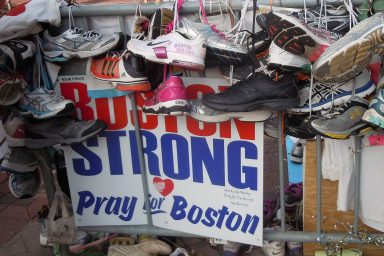The author finally manages to get himself and his family out of Russia, but he never escapes those who lie,
PERSPECTIVE
This is Part 4 of a four-part series. Read Part 3 here.
In early February, I had written a worst-case-scenario letter to my son, printed it out, and sent it to a friend in Chicago for safekeeping. I couldn’t be sure of what was going to happen, or of what the ultimate consequences of the gathering storm might be for me personally — but just in case I disappeared into a penal colony, I wanted him to have something about what I was thinking in the moments before everything changed. The letter weighed the dilemma:
When is it really definitely time to go? If I thought there was any serious risk of me falling out a fifth-story window in the next week, we’d already be gone. But I don’t, and we’re not. If they start to arrest people like me, what do we do then? Dare them to give me material for a Darkness at Noon redux, or run away and regret doing nothing to maybe minimally influence events in the right direction? Repression is the sincerest form of flattery, and the repressive apparatus here operates on a very high level of competence.
Slouching Toward Betlemi Street
Less than two weeks later, we were gone. The night after that birthday party with the Russian liberals, Vladimir Putin went on television to announce Moscow’s decision to formally recognize the independence of the Donetsk and Luhansk People’s Republics — territories that Russia had not-so-secretly been propping up both economically and militarily for going on eight years.
By the end of his unhinged speech, I had booked three one-way tickets to Tbilisi, Georgia. I was certain enough of the invasion’s imminence and certain enough of the crackdown that would follow that I didn’t see any sense in staying to take up the fight. Maybe I was just chickening out.
On the afternoon of Tuesday, February 22, I made what I thought was likely my final appearance on Russian television. For the most part, I stood around sullenly with my hands in my pockets, drawing attention to the fact that the bulk of the Russian invasion force was not concentrated in the areas around the Donbas territories — but positioned within striking distance of Kyiv.
On my way out, I recommended to the camera crew and makeup girls that they convert any spare rubles into dollars. Only the makeup girls took me seriously.
My wife was skeptical that we really needed to clean out the refrigerator, but she ate most of a tub of chocolate ice cream to help out anyway. I agreed that if nothing too bad had happened by Saturday, we would buy return tickets in time for our son to be back in school on Monday.
On the way to the airport for our 11 p.m. flight, my producer wrote to inform me that I had been scheduled to appear on the Thursday afternoon episode as usual. I responded that I was physically unable to be there, and after a conversation in which I somewhat agitatedly predicted that by the end of the week, the show’s hosts — at a minimum the hosts — would have become war criminals, she consented to cover for me, telling the higher-ups that I wasn’t feeling well.
We agreed that if Kyiv wasn’t under attack by Sunday, then I would be fully recovered and back in the studio on Monday afternoon.
We had a late-night layover in Baku, Azerbaijan. When I connected to the terminal’s Wi-Fi, there was a message waiting for me from an international relations professor who had been at the Sunday evening birthday party. He wanted to know if subsequent events had led me to reconsider my worst-case prediction. I held off on writing any sort of response.
At 4:30 a.m., despite reports of increased military activity around the Donbas and possible missile strikes on Ukrainian military bases further west, the red-eye to Kyiv took off as scheduled. Two hours later, a few gates down from us, the 7:30 flight to Kyiv was canceled. My son and I walked down to observe the scene. After everyone else had walked back toward passport control to make other plans, one well-dressed young woman still stood in front of the tableau sobbing.

Nightly protest against the Russian invasion of Ukraine in front of the Georgian Parliament Building in Tbilisi. Photo credit: Michael Wasiura / WhoWhatWhy
We got to Georgia just fine and started settling in, at least for the medium term. At the nightly anti-war protest in front of the Georgian Parliament Building, we run into ever more Russians — all of whom confess to guilty feelings about demonstrating abroad in relative safety, and none of whom have any plans to return home anytime soon. Every evening, their number grows.
Every day I get a message from someone back in the States asking what they can do to help, and every time I answer that I wish I knew. When my family and I go out in the evening for khachapuri and khinkali at the basement cafe down the street from our interim apartment, we know that our friends in Kyiv and Odessa are hunkering down for another night in the basement bomb shelter. I send them Facebook messages featuring photographs of all the blue and yellow flags decorating the Georgian capital, and then Nina and I climb into bed and stay up until 2:00 a.m. following on Telegram as the bombs fall.
I’ve also taken to trolling the Russian talk show’s evening host — the one who quit bringing me on the air back in December after I refused to “admit” that the whole war scare was just one more “highly likely” example of Russophobic fake news.
After watching an evening’s worth of atrocity videos, I choose one of the day’s several examples of a Russian war crime and send it to him, along with a caption about how “the tribunal will not forget about you.”
While walking with my family along Betlemi Street in the Old Town section of Tbilisi, the host sent me a very long response. After a typically windy recitation of past American offenses, real and imagined, the Russian propagandist more or less got to the point:
Your country armed and trained Nazis.
You excused them and whitewashed them here in the mass media.
You are an accomplice to Nazism, in case you did not understand.
An active one.
Keep that in mind.
But it’s still not too late to rethink things.
To gather up the remnants of your conscience and at least shut up, for a start.
And so I am NOT worried — there will be a tribunal.
There will be a tribunal.
You will answer for all of these Nazis.
Either we will again defeat the Nazi forces cultivated by you from across the ocean, or else… or else already nothing will matter to anyone :)
The population of a nuclear superpower is still living in a parallel universe. This story is far from over, but if it does ultimately end with me sitting in a dock at The Hague, I will consider that to be a happy ending, provided that every last one of my former on-air interlocutors is seated right there beside me.

Michael Wasiura (far right) posing with his fellow Russian TV pundits. Photo credit: Screen shot from Russian TV
If I knew it was all a charade, why did I continue doing those talk shows? I thought it might be beneficial if someone figured out how all of this works. In November 2016, I was genuinely shocked at how many of my parents’ pleasant neighbors back in Michigan really believed it would be a good idea to put a dangerous con artist in the White House. After spending four years with Russian propagandists, I have a fairly unique understanding of how much worse things can get.
Somewhere around 26 percent of voting-age Americans still believe that the 2020 US presidential election was decided by voter fraud, and another 16 percent aren’t sure. In other words, 42 percent have not accepted Biden as president. Forty-two percent is an uncomfortably large proportion, but at least it isn’t 97 percent — the proportion of Russians who, despite all of the irrefutable evidence, simply refuses to accept the fact that their government was responsible for the chemical weapons assassination attempt on Sergei Skripal.
For anyone who thinks things can’t possibly get any worse, Russia has some very real news for you.
This is Part 4 of a four-part series. Read Part 1 here.
Michael Wasiura is a freelance writer. A graduate of the University of Michigan, he received a Master’s Degree in International Economic Analysis from Fordham University, then taught English in Moscow before becoming a fixture on Russian television.




